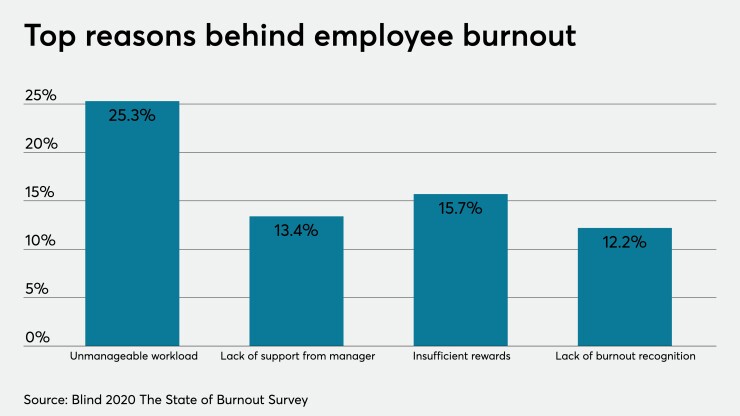As employees adapt to remote work, the line between extreme productivity and exhaustion has been dangerously blurred.
The number of employees
More than 60% of employees say they are burned out, but less than 15% said their company had a plan in place to alleviate stress, the survey found. Why haven’t companies taken more initiative? They might not know they need to, says Jessica Tropper, people operations manager at TravelBank, a corporate expense and travel management company.
“They either don't realize how much burnout is affecting their employees and their company or they don't know where to start,” Trooper says.
When asked what preventative measures their company could take, the Blind survey found that 83% of employees believe mental health and fitness subscriptions like TalkSpace and Peloton should be offered and paid for by their employers. TravelBank has implemented a work from home expense policy that includes everything from an Aaptive membership, which provides fitness classes and training programs, to smoothie delivery from DoorDash.
Read More:
Even before the COVID-19 crisis, burnout was a persistent problem in the workplace. The Blind survey found that marketing, sales and finance sectors had the highest instances of employee burnout. But with work from home mandates
Not only will this have an impact on mental health, it could affect employee retention. A quarter of employees say they plan to
“Company leaders are still knee-deep dealing with the pandemic, but they have to look ahead to fend off a talent tsunami,” Melissa Jezior, president and chief executive officer of Eagle Hill Consulting, said in a statement. “With more than half of the workforce feeling burnt out, employees may be even more motivated to make a move.”
Addressing burnout before it’s too late is a matter of implementing
“Companies may feel like addressing burnout is an additional resource of time and funds,” Trooper says. “But it is a necessary investment for employees and the overall mission of the company.”






